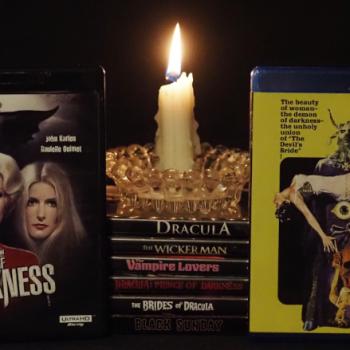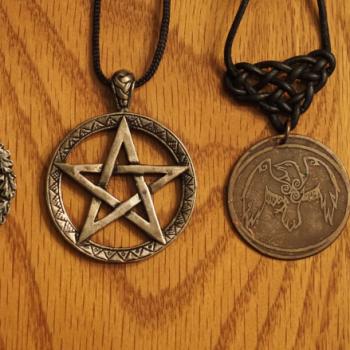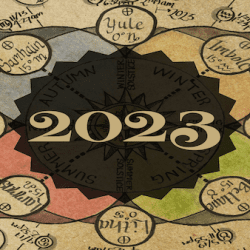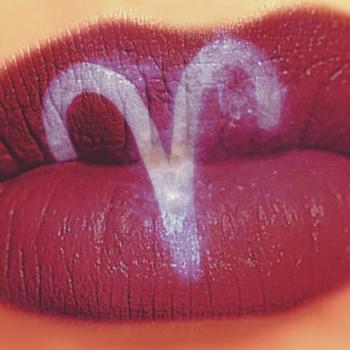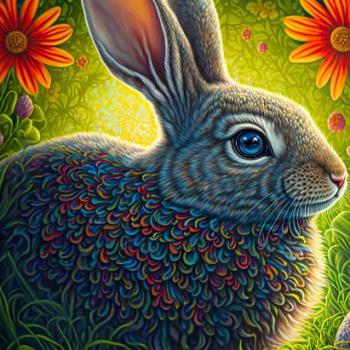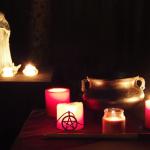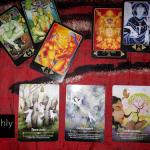When is the pagan New Year? Well, there are a few different schools of thought about defining when the year officially comes to a close.

Many pagans believe that Samhain’s passing marks the beginning of the New Year. Primarily, this comes from Celtic traditions, where Samhain was celebrated as the last harvest of the year and the start of winter, thus, the beginning of a new year. This is also, in part, because of the emphasis on death within this sabbat. As such, Samhain can symbolize the previous year’s death.
Another ideology is that Imbolc is the beginning of the new cycle. Imbolc is situated between the winter solstice and the spring equinox. Unlike viewing death as the marker for the year’s end, this approach focuses on the rebirth of the earth. Depending on the year, this sabbat also often falls on or near the lunar new year, which makes it a great candidate for a new year celebration.
While not as widely accepted, some pagans consider Yule to indicate the end of the year. This could be influenced by modernity and the proximity to the calendar New Year, but it could also be the rebirth of the sun. Yule, or the Winter Solstice, is the shortest day of the year, with each day growing longer until the summer solstice. As such, this signifies the birth of the sun and the beginning of a New Year to some pagans.
Deciding which of these marks the new year for you is an independent pursuit. That said, you don’t necessarily have to choose just one. My own practice is a hybrid of yesteryear coupled with my surroundings. I have my own spiritual beliefs and practice, but I also show up for family Christmas and New Year celebrations. The two can coexist quite nicely, and why would I pass on a cause for a celebration?
Calendar New Year Traditions
While when to celebrate can be debatable, there are certain longstanding traditions that I, as well as many others, like to do to honor the calenders year’s end. What traditions I participate in largely depend on who I am ringing in the New Year with.
For instance, when I am with my husband, one tradition his side of the family has is to eat 12 grapes when the clock strikes midnight. This tradition originated in Spain. If all twelve grapes are consumed before the clock hits 12:01, you will have a prosperous New Year.
For the years I’ve celebrated with Southern friends and family, we have had a meal that includes collard greens, black-eyed peas, and cornbread on New Year’s day. This tradition is prevalent across the Southern states. For this meal, the greens represent money, the peas represent coins, and the cornbread represents gold. Consuming these on New Year’s day is thought to bring good fortune.
Another longstanding and widespread tradition of the New Year is popping champagne at the stroke of midnight with a subsequent toast to the new year. This tradition is French in origin—as is the champagne—but is now a common tradition across the globe. The popping of champagne represents a joyous New Year and a bringer of good times. While champagne is a newer tradition, celebrating with a drink near the solstice is a time-honored pagan tradition.
In the same vein as toasting with champagne, there’s also the tradition of kissing at midnight. While the origins of this tradition are a bit murky, it may have emerged from Saturnalia. In modern times, this tradition is another one that is honored globally by many. It is thought that kissing at the stroke of midnight would ensure a year full of love.
If you choose to mix the New Year with pagan traditions, there are many sources of inspiration worldwide. One of the best ways to do this is to look towards your family’s traditions or those of your ancestors. By leaning into our heritage, we’re able to merge our present existence with those of the past and cultivate a meaningful connection between the two.
New Year Spell Jar
One ritual I like to do to honor the calendar new year and my craft is creating a New Years’ spell jar with my intentions for the following year. This jar can be a small corked jar, mason jar, or any cleaned container you have on hand. Depending on the jar you have selected, the amount of the ingredients can be altered to suit its size.
Materials:
- 1 jar
- 1 piece of paper
- 1 pinch of dried dandelions for manifesting wishes
- 1 pinch of ground cinnamon for success and speed
- 1 pinch of sea salt for purification
- 2-3 bay leaves to attract good fortune
- citrine to attract abundance and happiness
- smoky quartz for manifestation and luck
Directions:
- On a sheet of paper, write down your intention. Roll this piece of paper tightly so you can add it directly into the jar.
- In the jar, add each ingredient, including your written intentions. I like to assign each component its purpose as the ingredients are added.
- If desired, seal the jar with yellow or gold candle wax for happiness and success.
- Place this jar on your altar until the intention has manifested.
Should I Celebrate?
The question of whether a person should celebrate should be answered within ourselves. Do you feel called to celebrate the calendar new year—aside from social pressures to do so? If the answer is no, skip the celebration. There is no harm in this. However, if the answer is yes, grab the champagne and rejoice.
Despite a love for ancient traditions predating ourselves, we are also beings of this current era. We exist in this present space while maintaining a connection to those before us and the world around us.
Personally, what I’ve found most sustainable for my practice is the ability to remain fluid and adaptable. For me, this includes honoring traditions that are not inherently a part of a pagan practice but are a part of my life or important to those around me. I would never excuse myself from a celebration for the sake of being traditional.
The process of breaking down and understanding certain New Years’ customs and traditions helps me navigate this while merging it with my own spirituality. Am I simply toasting with a glass of champagne at midnight, or am I consuming a potion meant to ensure my good fortune? Am I kissing my loved ones, or am I casting a spell for a loving new year? Perspective, as well as intention, matters.
Whatever you decide is right for you and your practice—is right for you and your practice. Trust yourself and your intuition.




